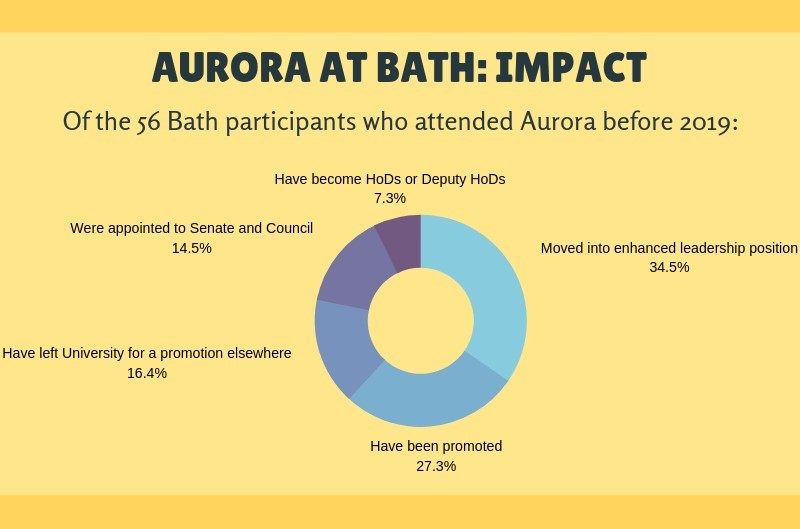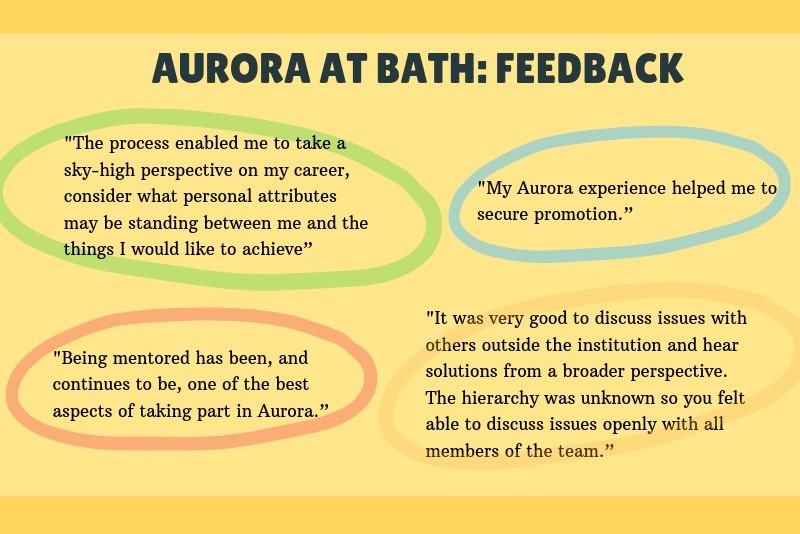The Athena SWAN Charter is a vehicle for delivering culture change in the workplace. In reflecting on what we have achieved in the 10 years since we were first awarded a bronze level institutional award, one key area has been the extent to which women are represented at senior faculty and departmental roles, including Heads of Departments, and on decision-making committees at the University.
A significant gender imbalance remains at the highest level of management in higher education. Progress towards improving women’s representation in leadership roles has been slow. While women are 54% of staff working in UK higher education, men make up the majority of professors (75% male), senior managers (69% male) and heads of institutions (76% male) (ECU 2018 data). Research shows that there is no gender imbalance in aspiration to senior management roles; the proportion of women and men who aspire to these roles is similar. So what accounts for the under-representation of women? It is argued that women may have less ‘agency’ (manifest as self-confidence, knowledge and ability to influence) and/or that there are structural inequalities that present a barrier to progression (Shepherd, 2017). The University has taken actions to support women to develop ‘agency’ as well as addressing any structural barriers. Our approach to supporting women staff to take on leadership roles include working on refreshing the University’s mentoring scheme for staff in the Education & Research job family, the Senior Women’s Academic Network, the Academic Leaders Programme, enhancing transparency of routes to membership of committees and leadership training.
Since 2010, we have seen the number of women across all committees rise from 23% to 50%, resulting in gender parity across all key influential University’s committees. Table 1 below showcases the progress we have made. Council and Senate have 48% and 51% female members. Even the Committees that were dominated historically by male members of staff, such as Finance and Research, are now gender balanced.

Table 1: Committee membership data since 2010/11, supplied by Governance & Compliance team, in Vice Chancellor’s Office.
Looking at representation of women as Heads of Departments (HoDs) suggests that there has been little change. In 2008/09, there were four female Heads of School/Faculty/Departments out of a total of 20.5 positions, all in the Faculty of Humanities and Social Sciences (H&SS). Since then, this number has remained the same, albeit it is no longer just H&SS hosting female HoDs. However, there has been a huge increase in the number of female Deputy Heads as of August 2019. Out of all academic Deputy Heads at the University, 55% are now female, compared to 20% in 2009. This growth will hopefully provide a more gender balanced pipeline of senior academic staff over the next few years.
Dr Marianne Ellis, Head of Department in the Department of Chemical Engineering, recently took on her leadership role to support the next stage of strategic direction for the Department. Marianne has shown excellent leadership skills and has been praised by colleagues across University. We asked Marianne if she has gone on any particular training programmes that she could recommend to colleagues who might be interested in exploring leadership training opportunities internally and externally. She said: “I have done most if not all of the internal training courses for academic leadership, as well as Aurora, plus outside of University I work with a private career coach, and have professional coaching qualifications.” When asked how she manages such a busy schedule of Head of Department while maintaining her research profile, Marianne noted this requires strict planning, time management, clear priorities and commitment: “I have an excellent research group, with fixed meeting time with group members, and they are doing great work. I’ve also got very good at working anywhere, and can pick different things up for a few minutes here and there, which all add up. I diarise downtime as well as work, and am pretty strict with this.” She also adds that she's been fortunate to have an excellent deputy HoD “to not only share the official load but to share the unofficial load too”.
Prof Carol Taylor, Professor of Higher Education and Gender in the Department of Education, has a research interest in gender and higher education. She shared her views on supporting women in leadership:
“Micro actions on gender equality can, if we embed them in the structures and cultures that shape our research, teaching and institutional work, have big effects. When supporting women in leadership and striving for gender equality, its down to three key areas: seeking to change structures, creating cultural change, and a clear commitment to action.”
Prof Carol Taylor also highlighted the benefits of serving on various committees, from her personal experience of the Chancellor’s Prize Committee and the Promotions Committee: “While this work is, in itself, fascinating to undertake, it has also meant that, as a new professor at Bath, I have been able to gain insight into some of the ‘inner mechanisms’ of how the wider university operates.”
Since its inception in 2013, the University has participated in Aurora, a nationwide leadership development programme for women up to Senior Lecturer or equivalent, run by Advance HE. Seventy-one women from the University successfully applied for a place through a competitive process. They have taken part in workshops and action learning groups with women from across the higher education sector and also worked with a mentor in the University.

The major benefits participants highlight from the programme have been a clarity and self-awareness that participants gain about their own strengths and challenges and their career plans. Dr Simon Inger, Learning & Organisational Development Manager in HR, said: “Majority of the participants in Aurora programme have been able to take significant steps into leadership roles through enhanced confidence and knowledge, often as a result of getting away from the University and hearing many other perspectives”.
Dr Anneke Lubben, Head of Material and Chemical Characterisation at University, has benefitted greatly from her experience of the Aurora programme. She was actively encouraged by her line manager to apply for a place and being awarded a place felt like a big boost. Anneke adds: “When Aurora was coming to an end, I sent an email to Prof Jane Millar, who was just stepping down from her role as Pro Vice Chancellor for Research. I asked her if she would be willing to be my mentor going forward, something I couldn’t have imagined doing prior to taking part in the Aurora programme.” Her bold email was a success and resulted in a very effective mentoring relationship over several years, where Anneke benefitted greatly from Prof Millar’s wider senior experience as well as her advice on building successful networks and tips on strategic and leadership thinking. Both Aurora and the mentoring relationship that followed boosted her confidence, helped expand her networks, and encouraged her to realise her career aspirations, especially given her non-classical career pathway – Anneke straddles two job families in her role – Education and Research, as well as Technical and Experimental.

Simon Inger also noted that Aurora participants stepped forward to take the programme, identifying themselves as leaders and going into a selective process, with the majority reporting the programme giving them an acceleration and enhancement, whether or not that involved promotion. An analysis of Aurora participants revealed that an overwhelming majority had taken steps to further their career through leadership roles, committees and HoDs/Deputy HoD roles. One example of this is Rachel Arnold, in the Department for Health: ‘’You are matched with an Aurora mentor and personally, this is where I have gained most benefit from the Aurora programme. My mentor - Professor Danaë Stanton Fraser from Department of Psychology - was instrumental when it came to planning my route from Lecturer to Senior Lecturer (which I was awarded in May 2018), as well as discussions around how to optimally manage a period of maternity leave and reintegration into academia. I have been able to take the learnings of the Aurora programme into various leadership positions including as the Director of Studies for PG Students.”
Alongside these formal schemes, there is also benefit in informal mentoring and networking arrangements. Dr Susie Douglas, Co-Director of the EPSRC Centre for Doctoral Training (CDT) in Statistical Applied Mathematics at Bath (SAMBa) and University CDT Lead, mentioned how important personal investment has been in growing her confidence and enabling her to develop creative and entrepreneurial thinking within a supportive framework: “I have been very lucky to have worked with people – particularly Paul Milewski and Andreas Kyprianou - who have been incredibly supportive and nurturing me into a leadership position. They gave me freedom to develop my own portfolio of activity, openly promoted me as a leader to colleagues across the University, and recognised my achievements.” Susie’s recent promotion to Co-director of SAMBa acknowledged the additional responsibility she’s undertaken over the last five years, all the hard work and extra opportunities that she’s taken, but without the support and encouragement from colleagues it would not have been the rewarding experience it has been.
We have made progress across the University in increasing the representation of women on senior decision making committees and in supporting women to develop their leadership potential. However, there remains work to do particularly at the level of HoD where a promising pipeline of Deputy HoDs may translate into HoD roles in future years. If you have any ideas about what additional actions we could or should be taking to increase agency or remove structural barriers to women taking on senior management roles, the EDI team would love to hear from you.
Aiste Senulyte, ED&I Officer at the University of Bath, and Dr Sarah Bailey, who is a Senior Lecturer in Department of Pharmacy and Pharmacology at the University of Bath, Faculty of Science Athena SWAN Champion and an active member of USAT, have brought the Athena SWAN Anniversary series project to mark a 10-year anniversary since the University achieved its first Bronze award. You can read more stories here.
Respond